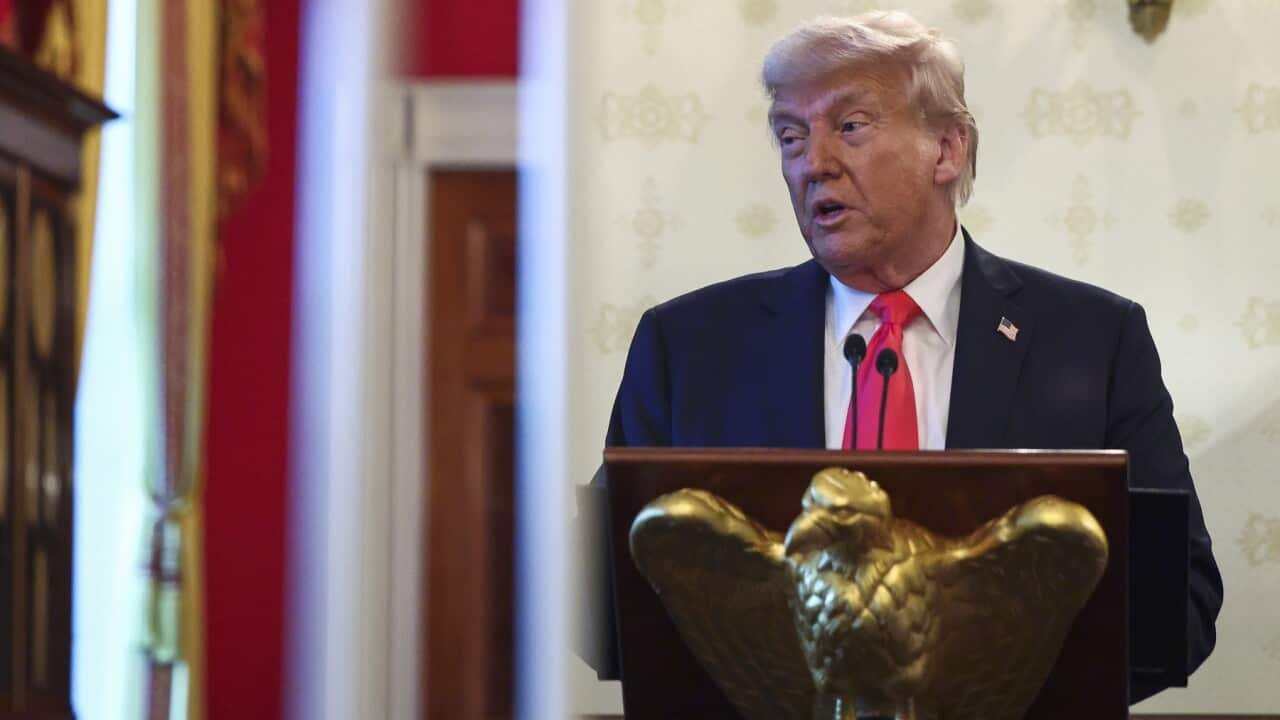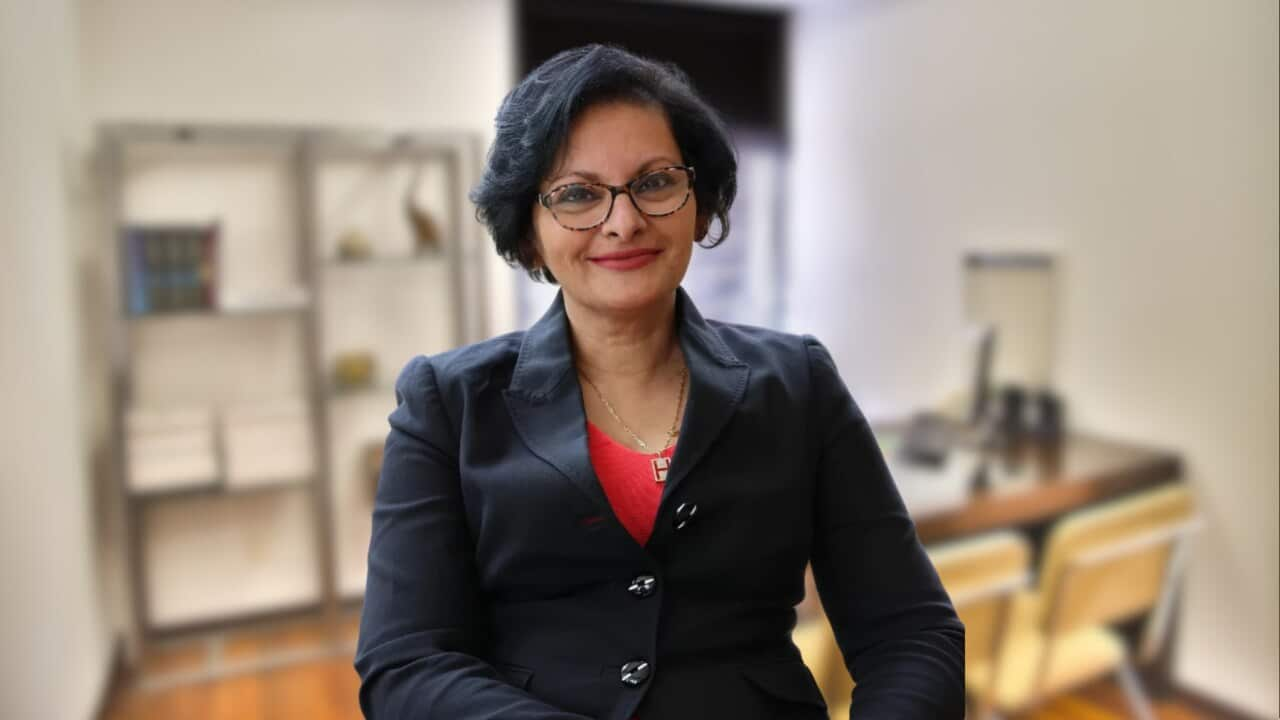TRANSCRIPT
In the last two months, Donald Trump's administration has set its sights on education and academic institutions across America.
From dismantling the Department of Education to cutting Federal research grants, the administration is even arresting and threatening some students with deportation.
The U-S President say he's working to tackle what many of his conservative allies say is a growing problem in American higher education.
"And we're holding back $8 billion from Harvard. Can we believe? We give Harvard $8 billion. And we're holding back Columbia, we're holding back a lot of schools because they're all woke. And they've hurt a lot of people."
Now, the administration is threatening universities with funding cuts if they refuse to comply with the government's demands.
According to the Trump administration, many U-S universities have become proponents of antisemitism and ideological indoctrination.
With his sights set largely on the elite Ivy League schools like Harvard, Yale, and Columbia, many academics fear the government is launching an all out attack on higher education and academic freedom.
But Donald Trump's crackdown on higher education was not a hidden agenda, the U-S President has long criticised what he calls the "woke agenda" of elite universities in the country.
At a rally in 2022, Donald Trump said cracking down on what he calls the "woke agenda" in US education was a key priority.
"It's time to finally and completely smash the radical left's corrupt education cartel. It's crazy what's going on. Our children are captives to unhinged Marxist educators, where do they come from? Who are pushing inappropriate sexual, racial and political material on our children, from the youngest possible age. The public school system has become an arm of the radical left and we are not going to allow this to happen."
Columbia University was the first to receive a letter from the Trump administration on March 13.
In the letter was a list of demands.
Some of the measures, like a ban on masks, which are often used by student protesters during rallies, weren't considered too controversial.
Others, like a redefining of antisemitism to include antizionism, a review of hiring processes, and an order to place the Middle Eastern studies department under academic receivership for five years, have sparked more concern among the faculty and students.
If Columbia failed to follow through with the administration's demands, Donald Trump threatened to cut millions in federal funding grants.
Columbia agreed to all the conditions, but funding was not reinstated.
Instead, the U-S government is now considering measures that could give the White House leverage over university matters for years to come.
Now, America's oldest and wealthiest university, Harvard, has pushed back.
In a public statement on the university website, Harvard president Alan Garber said this.
"Late Friday night, the administration issued an updated and expanded list of demands, warning that Harvard must comply if we intend to “maintain [our] financial relationship with the federal government.” It makes clear that the intention is not to work with us to address antisemitism in a cooperative and constructive manner. Although some of the demands outlined by the government are aimed at combating antisemitism, the majority represent direct governmental regulation of the “intellectual conditions” at Harvard."
Veena Dubal is a Professor of Law at the University of California.
She says Harvard's quick decision to stand up to the government could pave the way for other schools to do the same.
"Everyone was looking to see who would be the first universities to stand up to the Trump administration and I'm really, really heartened that it is Harvard, one of the nation's oldest institutions, certainly one of the west, the most well endowed with, you know, a lot of, frankly, political connections. I mean, this could be, this could be a game changer in terms of saving, saving the sector"
Despite billions of dollars worth of funding on the line, the university administration has become the first university to publicly reject what it calls unlawful demands.
The Trump administration says it will freeze $2 billion of federal funding for Harvard and has now issued orders to strip the institution of its tax-exempt status.
White House Press Secretary Karoline Leavitt says Havard must apologise for allegedly allowing antisemitism on campus.
"The university failed to impose formal discipline on any students for this antisemitic conduct violations including the occupation of a campus building and the disruption of classes with bullhorns. The president believes Harvard should apologise to its Jewish American students for allowing such a grievous behaviour. As for the tax exempt status, I would defer you to the IRS for any updates."
According to a survey conducted by the Associated Press, at least 790 students at more than 120 colleges and universities have had their visas revoked or their legal status terminated in recent weeks.
Columbia student Mahmoud Khalil was the student to be detained over his involvement in pro-Palestine protests on university campuses.
Since his arrest on March 8th, at least a dozen more students have been arrested and detained.
Most recently, Columbia student Mohsen Mahdawi was arrested at an immigration services centre in Vermont, where he had arrived to complete the final step in his citizenship process.
The Trump administration claims that by engaging in pro-Palestinian activism, Mr Mahwadi undermined peace in the Middle East and threatened U-S interests to achieve a peace deal.
A friend of Mohsen, Christopher Helali, says the administration is targeting those who disagree with them.
"We have a reason to believe that he was detained for the same reason that Mahmoud was detained as well and all these Columbia students and all these other students, including Ozturk at Tufts University, just for exercising their constitutional rights and standing up for Palestine. That's why we believe that they were detained and they're being targeted in a vicious campaign online and with the administration's support, the Trump administration's support to get rid of these students who have divergent viewpoints than the administration."
This isn't the first time something like this has happened in America.
In the 1950s, during the early Cold War period, a practice known as McCarthyism, or the Red Scare, swept through the United States.
Named after Senator Joseph McCarthy, McCarthyism refers to making accusations of subversion or treason without proper evidence.
Fuelling the moral panic about communists infiltrating American society, McCarthyism led to the aggressive investigation, firing, blacklisting and even jailing of thousands of people associated with more left leaning politics.
Anu Joshi is the National Campaign Director for Immigration at the American Civil Liberties Union.
She says a similar threat is facing Americans today.
“The Trump administration's attacks on our right to dissent are the biggest threat to the First Amendment since the Red Scare. The unconscionable and unconstitutional arrests of international students and scholars should alarm every one of us. ICE has illegally snatched people from their homes and neighbourhoods, threatened their legal status and sent them across the country with no notice to their loved ones or their lawyers. All of this in direct retaliation for constitutionally protected speech.”
Professor Chris Ziguras is the Director of the Centre for Higher Education and the University of Melbourne.
He says that despite claims that higher education is becoming too insulated and left wing, it isn't the universities that have changed.
"It's not that universities have changed. What's changed is the Republican party fundamentally. So the ideas that are being espoused by Trump and the leadership of the Republican party now are really radical and they are way outside of the scope of political debate in the United States for many, many, many decades for a century. So you've got a radical movement that's captured the White House and this radical movement doesn't like any questioning of its belief system. And that's what's changed."
While many of the Trump administration's demands seem to focus on the humanities and social sciences, Federal research grants are being cut in a range of disciplines.
The administration has capped overhead costs for scientific research in ways that have already left thousands out of a job.
Professor Ziguras says some of the cuts have already halted the work of researchers around the world who were working on U-S led research projects.
"And so you've got a huge volume of research and decades of collaboration just sitting there stalled. There's a lot of academics around the world who won't travel to the United States in this climate. I'm one of them. There's no way I would travel to the United States now for work and I would discourage any of my colleagues from going there as well. And that's going to be felt in the US where it's going to be very difficult for them to collaborate internationally because people will not want to travel there. And so when people are conceiving new projects and they're trying to work out who to collaborate with in the future, and they're putting in grant applications and so on, academics around the world and researchers will be quite wary about trying to collaborate with their US colleagues until this crisis is resolved."
With hundreds of millions in funding already cut from various programs, some researchers in the U-S say they're already thinking about leaving the country.
Michael Oleson is an Epidemiologist in Washington D-C.
He says the cuts are going to undermine more than education.
“I have found, like myself, a lot of people have been, in the sciences have been, rather aghast at what's happening. This is going to undermine public health, it undermines education, and it will undermine healthcare as well, and that does not paint a very good future for the U.S.”
On the future of his career, Michael Oleson says he may have to look abroad.
“I’m receptive to that, not necessarily Europe. I also would look at Australia, New Zealand, Canada. I find that the anti-science movement that's happening under the current administration to be pretty bad for people that really appreciate facts and evidence."
There is little precedent for what Donald Trump is doing with the U-S higher education system.
However, political interference in higher education and research institutes is not.
While many of Donald Trump's policies seem unpredictable, Chris Ziguras says a look at historical examples of academic repression can give us insight into where the administration is heading.
"This sort of political interference in independent institutions like higher education and the court system and so on is very typical of authoritarian governments. So we've seen it happen in Russia. That's definitely something that you can see very clearly in Hungary, in Turkey and other places where you have strong men, men who want to be seen as strong in power and then use their power to try and shut down other forms of authority and expertise. And that's definitely what's happening in the US and it's very, if you look around the world, you can see many examples where this has happened. The shock is that to see this happening in the United States is something that very few people ever imagined would be taking place."













